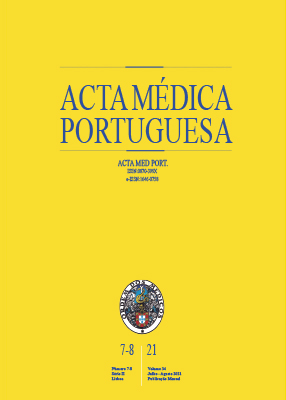Strongyloidiasis: A Diagnosis to Consider in Previously Endemic Regions in Portugal
DOI:
https://doi.org/10.20344/amp.12960Keywords:
Portugal, Strongyloidiasis/diagnosis, Strongyloides stercoralisAbstract
Strongyloides stercoralis is a parasite capable of surviving for decades in a single host, due to its ability of auto-infection. Strongyloidiasis usually presents a chronic and asymptomatic evolution, and isolated eosinophilia, cutaneous or gastrointestinal abnormalities are the most frequent findings. Between the 1910s and 1980s, several cases of autochthonous strongyloidiasis in Portugal have been described. We report the case of a patient with abdominal pain, ascites and marked eosinophilia. The diagnostic investigation excluded frequent causes of eosinophilia. The diagnosis of strongyloidiasis was confirmed by immunoenzymatic positivity of the antibody to Strongyloides stercoralis. Since the patient lived in a region where several cases of strongyloidiasis were diagnosed in the past, and given the absence of previous trips abroad, this is the first case identified in recent decades of autochthonous strongyloidiasis in Portugal. The authors point out the possibility of chronic infection acquired in regions previously considered foci of great endemicity.
Downloads
Downloads
Published
How to Cite
Issue
Section
License
All the articles published in the AMP are open access and comply with the requirements of funding agencies or academic institutions. The AMP is governed by the terms of the Creative Commons ‘Attribution – Non-Commercial Use - (CC-BY-NC)’ license, regarding the use by third parties.
It is the author’s responsibility to obtain approval for the reproduction of figures, tables, etc. from other publications.
Upon acceptance of an article for publication, the authors will be asked to complete the ICMJE “Copyright Liability and Copyright Sharing Statement “(http://www.actamedicaportuguesa.com/info/AMP-NormasPublicacao.pdf) and the “Declaration of Potential Conflicts of Interest” (http:// www.icmje.org/conflicts-of-interest). An e-mail will be sent to the corresponding author to acknowledge receipt of the manuscript.
After publication, the authors are authorised to make their articles available in repositories of their institutions of origin, as long as they always mention where they were published and according to the Creative Commons license.









